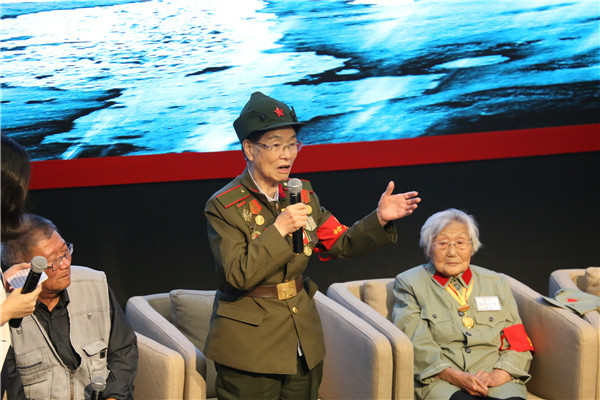
Li Min attends a Beijing event marking the launch of three new books about veterans who fought against Japanese invaders. (Photo provided to China Daily)
Old soldiers never die. That is, if they're remembered.
Sunday commemorated the Sept 18 Incident's 85th anniversary, marking the Japanese occupation of northeastern China. It's a day remembered with a mix of misery and pride.
Many in the crowd shed tears when 92-year-old female veteran Li Min stood onstage in the National Library of China to recall her experiences fighting the invaders and close calls with death.
"I was the only one among the comrades in my unit who didn't die on the battlefield," she says.
"I got lost and found another unit. I joined them to continue to fight. Most of them also died."
Li is one of only two surviving women veterans of the Northeast Anti-Japanese United Army led by the Communist Party of China.
Files show the army had about 30,000 guerrilla fighters when it was formed after the Sept 18 Incident. There were fewer than 1,000 by the end of World War II in 1945.
The NLC on Sunday released three new books based on interviews with United Army veterans.
It also opened an exhibition about this history, and the vets' bravery and sacrifice, that will run until Sept 30.
The 220,000-character-long Northeast Anti-Japanese United Army, one of the trilogy's books, includes oral history. It records interviews with 16 veterans and four of their sons since 2012.
"This has taken the longest time and included the most interviews among the NLC's oral history projects in recent years," project organizer Tang Gengsheng says.
Tang's group interviewed all known 25 veterans and 60 veterans' sons in seven province-level administrative regions. It filmed 240 hours of footage, and obtained numerous manuscripts and pictures.
Only 13 of the vets are still alive.
"We have to hurry against time," Tang says.
"Records must be saved before the old soldiers are gone."
The other two books are compiled according to two researchers' interviews, starting from the mid-1990s.
"Soldiers had to fight invaders. Their families were killed in many brutal ways," researcher Jiang Baocai says.
"Some details shock me. Some women soldiers abandoned their babies when hiding in the forests, since the infants' cries attracted enemy attention.
"War is so cruel. But they didn't have a choice. It's much more difficult to honor unnamed people than (famous) heroes. But history is made by many unnamed people's efforts."
Oral history scholar Ding Yizhuang expects more projects on United Army to follow the books' release.
"Wars' oral histories reveal many vivid details that can't be gained from official records," she says.
"The books provide many new angles from heroines, although wars are often seen as fights among men."
The research faced many difficulties. One is confirming details provided by interviewees with historical records.
"And some veterans' children initially refused to do interviews due to the lack of their parents' recognition as heroes," Jiang says.
Some soldiers returned to their farms rather than fight until the war's end. Authorities in later decades refused to recognize their brave deeds.
"I'm glad the new books give those soldiers the recognition they deserve," says Li.
"Every memoir of us survivors is not about individual memories but serves a whole generation."
Liu Yuebin, a history professor with the Party School of the CPC Central Committee, believes more research on the United Army will dispel some stereotypes about the War of Resistance Against Japanese Aggression (1937-45).
The war has traditionally been considered to have broken out with the Marco Polo Bridge Incident in Beijing. But more official documents reviewed in recent years point toward the Sept 18 Incident.
"We got used to saying 'eight-years' when referring to the war in textbooks," he says.
"However, that's unfair to northeastern China's fighters, who sacrificed before the rest of the country."


















































